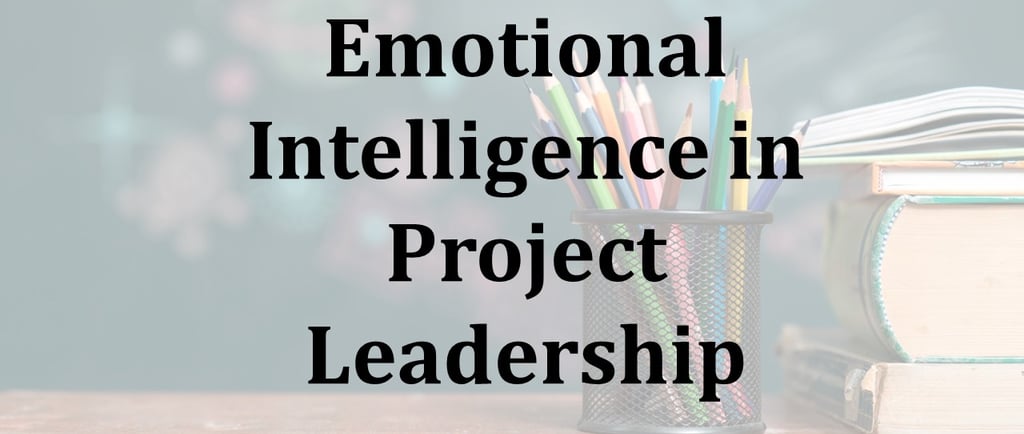Emotional Intelligence in Project Leadership
Elevating Project Leadership: The Strategic Imperative of Emotional Intelligence
Vikram Kaushik
7/21/20242 min read


Elevating Project Leadership: The Strategic Imperative of Emotional Intelligence
In today's dynamic business environment, the success of projects is increasingly reliant on more than just technical expertise and procedural knowledge. For executives, the nuanced integration of Emotional Intelligence (EI) into project leadership is essential for achieving sustainable success. Emotional Intelligence equips leaders with the ability to navigate complex interpersonal dynamics, foster a resilient organizational culture, and drive strategic outcomes.
The Core Components of Emotional Intelligence
Emotional Intelligence is defined by the ability to recognize, understand, manage, and influence emotions—both in oneself and in others. This capability is segmented into four critical components:
Self-Awareness: The ability to perceive one's own emotions and understand their impact on others and on project outcomes.
Self-Management: The ability to regulate one's emotions, particularly in high-stress scenarios, and to adapt to changing circumstances.
Social Awareness: The ability to understand and empathize with the emotions of others, fostering strong interpersonal connections.
Relationship Management: The ability to develop, manage, and sustain positive relationships, and to inspire and influence others.
Strategic Benefits of Emotional Intelligence in Project Leadership
Optimized Stakeholder Engagement
Leaders with high EI can effectively communicate with stakeholders, ensuring clarity and empathy in every interaction. This results in better alignment of stakeholder expectations and enhances buy-in for project initiatives. From an executive standpoint, effective stakeholder engagement is crucial for risk mitigation and strategic alignment, facilitating smoother project execution and enhanced organizational coherence.
Enhanced Team Dynamics
Executives recognize that the bedrock of any successful project is a cohesive, motivated team. Emotionally intelligent leaders foster an environment of trust and collaboration, enhancing team performance and innovation. By valuing and recognizing individual contributions, these leaders drive higher levels of engagement and productivity, directly contributing to superior project outcomes and competitive advantage.
Superior Conflict Management
Conflict is an inevitable aspect of project management. Leaders with high EI possess the skills necessary to address and resolve conflicts constructively, maintaining team cohesion and focus. Their ability to navigate emotional complexities and mediate disputes ensures minimal disruption and sustained project momentum, which is critical for maintaining timelines and quality standards.
Improved Decision-Making
Executives understand that informed, timely decision-making is the cornerstone of successful project management. Leaders with elevated EI maintain composure and objectivity under pressure, enabling them to make balanced decisions that consider all relevant factors. This leads to decisions that are not only strategic but also empathetic, aligning with the broader organizational goals and values.
Resilience and Adaptability
In an era marked by rapid change and uncertainty, resilience and adaptability are indispensable traits for project leaders. High EI equips leaders with the emotional resilience to handle setbacks and adapt to evolving circumstances. This ensures that projects remain on track despite challenges, safeguarding against potential derailments and fostering a culture of continuous improvement and innovation.
Developing Emotional Intelligence in Leaders
To leverage the full potential of EI, organizations must prioritize its development in their leadership programs. Strategies for cultivating EI in leaders include:
Executive Coaching: Personalized coaching focused on enhancing EI competencies, providing leaders with tailored feedback and development plans.
Leadership Training Programs: Comprehensive programs that integrate EI training into leadership development, emphasizing practical application in project management scenarios.
360-Degree Feedback: Structured feedback mechanisms that offer leaders insights into their EI strengths and areas for improvement from multiple perspectives.
Mindfulness and Stress Management: Initiatives that promote mindfulness practices and stress management techniques, enhancing leaders' ability to manage their emotions effectively.
For executives overseeing complex projects, integrating Emotional Intelligence into leadership practices is not merely beneficial—it is essential. High EI in project leaders drives effective communication, fosters robust team dynamics, facilitates conflict resolution, enhances decision-making, and ensures resilient leadership. As organizations navigate the complexities of the modern business environment, prioritizing EI development will be a strategic differentiator, driving project success and contributing to long-term organizational growth.
